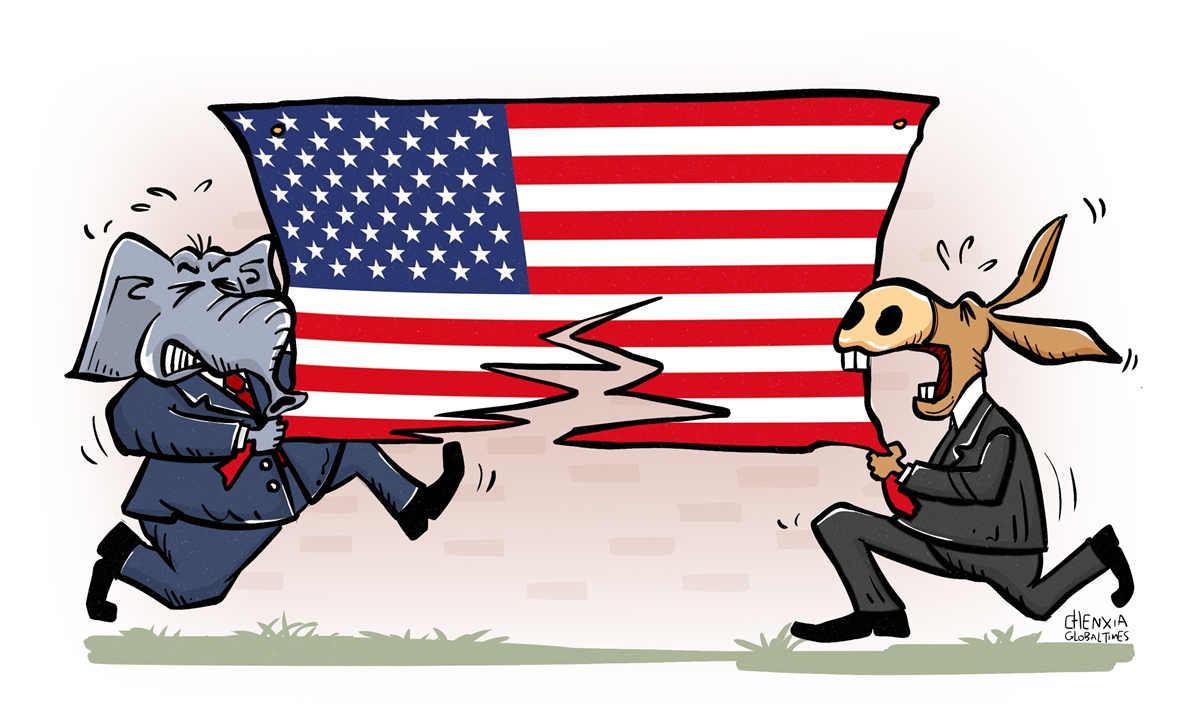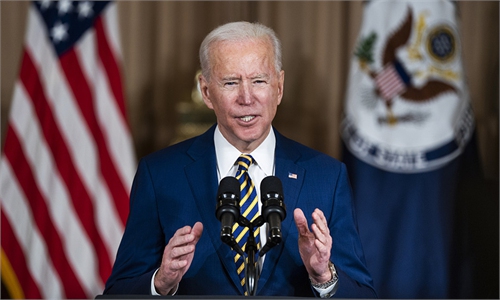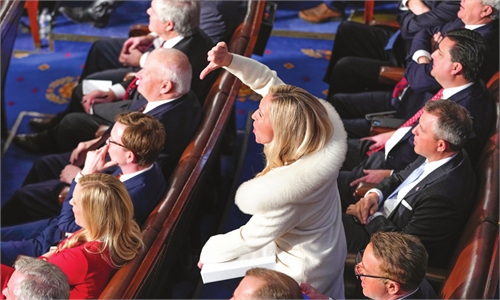
Illustration: Chen Xia/Global Times
US President Joe Biden delivered his second State of the Union address to a joint session of the US Congress last week, during which he was booed and jeered by the opposition Republican Party lawmakers. The yelling of "liar" and other vulgar terms at the 80-year-old president and the heavy security presence around the Capitol Hill are clear reminders that partisan extremism and political confrontation are becoming deeply rooted in US politics and society, even though two years have passed since Donald Trump supporters' raucous rampage on the Hill.Despite Biden's narrative that the politicians in Washington and the broader American public should seek "unity" and "healing" in his 73-minute speech, the divide and gap are glaringly there for everyone to see - on nearly all issues, including taxation on billionaires and rich Americans, homelessness on the streets, income inequality, medical care and social welfare for the poor, immigration, abortion and same-sex marriage, racial hatred, gun control and police brutality.
Biden took the annual "grand speaking opportunity" at the US Congress to tout his self-righteousness and personal achievements, emphasizing his administration's deeds in creating jobs and curbing runaway inflation, revitalizing US manufacturing sector, and his government's efforts to repair rundown infrastructure scattered across the country. Although Biden attempted to paint a rosy picture to the American people, many of his ambitious plans, such as bringing back manufacturing and staving off a sharp economic slowdown, are facing enormous difficulties.
Wasn't his inconsiderate, blind fiscal splurge of more than $4.7 trillion in 2021 and 2022, coupled with the Federal Reserve's quantitative easing policy of many years, the main cause of a cascade of consumer prices spiral-up and high levels of inflation unseen since 1981? At the same time, America's national debt has now snowballed to a whopping $31.4 trillion, a new record that Biden has to persuade the Republicans-controlled Congress to add more in 2023 by revising the debt limit. If not, the US will face a federal debt defaulting, which will immediately lead to another financial tsunami even more ferocious than the one in 2008.
Facing this grave challenge, a possible economic recession, stubborn inflation and depleted savings, the American people have given Biden low marks. According to a latest Reuters/Ipsos opinion poll, his public approval rating stands at 41 percent, just better than his predecessor Trump among past US presidents. As many as 62 percent of Americans think Biden has accomplished "little or nothing" during his presidency in the last two years. The number is very ominous for Biden's political prospects as the 2024 election cycle draws near and he contemplates a run at re-election.
And there will be more challenges for the Biden administration in 2023, as the US under his steering has jettisoned, jolted and fragmented the world, by trampling rough shod over the rules-based international order, erecting barriers of high tariffs and imposing economic and technology sanctions to contain other economies, building divisive political and military cliques, and even waging a proxy war in Europe.
As a matter of fact, Biden's emphasis on so-called revitalization of US industries and infrastructure, coupled with technological manipulation, is in essence an updated version of Trump's "America First" strategy, prioritizing the US domestic needs over the interests of others and the international community.
For example, the two landmark legislations trumpeted by the White House to help rebuild America, the CHIPS and Science Act, and the Inflation Reduction Act, even fail to take a trifling care of the interest of its European and Asian allies - manifesting the selfish, bare-knuckled attempt by Biden's team to pursue "America First and Foremost." And, the two pieces of laws also tell that the US is becoming increasingly anxious, restless and reckless, unsure of its future.
During his speech, Biden reiterated that his government doesn't seek conflict with China, and the US will work with the world's second-largest economy and the biggest trader in areas where their interests align. However, he cast the relationship largely as of great-power strategic competition, meaning his administration will continue to play the zero-sum game, and renege on past fruitful cooperation between the two nations.
His speech was found to contain a sense of superficial boldness. If China aspires to threaten the US' sovereignty, Biden remarked, the US would act. There were no details as to where that threat might arise since China has never undertaken any action to threaten the US' sovereignty, though recently Biden's team has used the recent case of a single drifting Chinese civilian airship to claim such a threat exists.
It seems that Biden's truculently hardline policies toward China are unlikely to be altered over coming months, with his highly divisive and acrimonious economic and technology "decoupling" efforts expected to continue, although the unknown end-result of that action might not favor the US.
As always, China does not shy away or flinch from a benign competition, though it dislikes vicious containment. For China, it is now imperative to ramp up investment on some selected segments of human resources and ramp up technology innovations in order to achieve tech self-reliance at an earlier date. Year by year, China's massive 1.4-billion and rapidly growing market will prove that only the true economic partners of China will benefit from the country's economic boom and prevail.
"Winning the competition with China should unite all of Americans," Biden said in his address, getting to the crux of his preaching. "For the last few years, our democracy has been threatened, attacked and put at risk," he said. But those threats and attacks actually do not come from China or other countries, but from the intensifying feuding within the US' own political landscape, as well as its increasingly polarized society where the so-called "America Dream" is rapidly fading and once affluent US households can only make their ends met each day.
The author is an editor with the Global Times. bizopinion@globaltimes.com.cn



